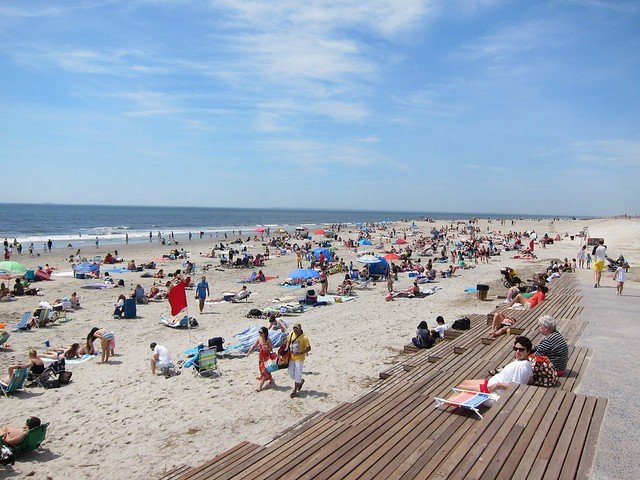How To Check The Poop Levels At Your Favorite NYC Beach
June 11, 2019, 9:40 a.m.
The primary concern at our local beaches is enterococci.

Many people, many poops?
Sometimes, while beachgoing, the need to be in the water rightthisveryminute overwhelms you. The sun hammers mercilessly on your scorched shoulders and gets its tentacles in between your eyelids, prying its way in even as you squinch them shut. The hot tub simply becomes too hot, and then you're windmilling your way across the sand to crash into the sea, arms wheeling wildly as an angry wave smacks you sideways and down you go, no time to even think about shutting your shrieking mouth. As the salt water seeps in, and as the cold shock of the ocean snaps you back to your senses—as you come sputtering back to the surface, only to get slapped across the face by another wave—you may wonder, 'Hey, how much poop did I drink just now?'
Spit all you want, but there's no scouring that thought from your brain. Because we all know people treat the ocean like a toilet, whether that means going to the bathroom or discarding used condoms in it (a thing you should not do to toilets, please think of the fatbergs, or the sea). The water's disconcerting opacity also erodes confidence, often looking—at least while you're in it—muddily green, just visibly dirty. Personally I will risk the strange chemical coating (???) that makes my hair go all brassy and brittle, but you can't ignore the weighty question of what in the heck might be leaching into your skin whenever you take a dip.
The primary concern at our local beaches is enterococci, a bowel-dwelling brand of bacteria that can be antibiotic-resistant and can cause gastroenteristis. (Symptoms include: fever; chill; nausea; stomach ache; diarrhea; and headache.) The risk of encountering enterococci rises in the wake of a big storm, when a high volume of rainfall mingles with the waste in our sewer system. That stormwater overflow spills out into the Hudson and East Rivers, and eventually the ocean, contaminating them with a special intensity after big storms.
Unfortunately, May proved the second wettest month on record across the country, New York City very much included. Surely you will remember all those cold downpours that kept us drenched for weeks in a row? Yeah, those would seem to spell doom for those of us who are determined to swim on every single beach trip, but hold that thought.
Waterborne pathogens other than enterococci exist, of course, and while cholera and dysentery and Hepatitis A and a bunch of other maladies can be contracted by submerging oneself in polluted water, when NYC Health Department employees test the water (which it does on a regular basis), they look for enterococci. And then, very helpfully, they let you know what they find: Results are posted to an NYC Beach Water Quality page, which shows you which of our sand strips are open, which are to be approached with caution, and which are definitively closed due to disgustingness. Right now, all but three (Gerritsen/Kiddie Beach, plus the beaches off of the Douglaston Manor Association and the Whitestone Booster Civic Association, are under advisory) are fully open.
Federal standards cap the acceptable amount of enterococci in a water body at a mean of 35 colony-forming units per 100 milliliters over 30 days. You will be shocked and overjoyed, I'm sure, to learn that Rockaway Beach has charted 4 cfu/100 ml on its past two test days, May 25th and June 8th, the only two dates currently posted. You will be further enthused, I know, when you hear that it achieved the same score on six of eight sampling days last summer. (On August 18th, it score 5 cfu/100 ml, and on September 1st, 7 cfu/100 ml.)
And! Breezy Point, the closest testing site to the best beach, the People's Beach, Jacob Riis Beach, charted similarly low poop scores, both this year and last: We've got 4 cfus/100 ml for the past two samples, and levels primarily anchored at 4 and 5 cfus/100 ml last year.
Which means that, when you go charging into the water in the Rockaways, you're not actually swimming in a toilet bowl, no matter how strongly your instincts scream that you are. Still, the Health Department recommends avoiding beach swims during and after significant rainfall; in the case of advisories and closures; and if you have open wounds or infections. If you are still concerned, just don't dunk your head. New York's may not be sparkling, pristine, visibly clean beaches, but they probably aren't as bad as you'd think. If they're good enough for the whales, they're good enough for you.